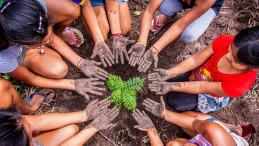The 2025 Interconnected Disaster Risks report ‘Turning Over a New Leaf’ is a call for deep, systemic transformation. As the world faces growing environmental, social and economic challenges, this report introduces the Theory of Deep Change – a framework that helps us to envision a thriving world free from risks – and highlights five fundamental shifts that can guide us toward a healthier planet and a fairer future. Here are the five changes we need to make:
Rethink Waste
The way we use and waste Earth’s resources is unsustainable, depleting finite materials and damaging the environment. Our current linear system of take-make-waste treats resources as unlimited, leading to pollution and loss. Shifting to a circular approach, where materials are reused and kept in circulation, can reduce waste and preserve resources. Embracing this change is essential for building a sustainable future where both people and the planet can thrive.
Realign with Nature
For centuries, humanity has treated nature as separate and inferior, exploiting it for progress at the planet’s expense. This mindset harms both nature and humanity. Instead, we should recognize our place within ecosystems and strive to coexist with natural processes for a more sustainable future. The report urges an approach that places harmony, restoration and respect at the core of our relationship with the Earth.
Reconsider Responsibility
The world is home to over 8 billion people, yet resources, opportunities and impacts are unfairly distributed. The poorest contribute the least to carbon emissions but suffer the most from climate change, while wealthier nations, the biggest polluters, have more means to help but often avoid responsibility. We have built many of our systems and structures on the underlying assumption that our own needs are more important than those of others. Instead, we should move towards a multilateral thinking, a shift from “me” to a “we” mindset to ensure inclusive decisions are made. Recognizing our shared global community is essential to finding fair, collective solutions.
Reimagine the Future
The choices we make today will shape the lives of future generations, yet society often prioritizes short-term gains over long-term well-being. This present-focused mindset contributes to environmental harm and reduces resilience for those yet to be born. Shifting to long-term thinking, for example through investing in renewable energy and including future interests in policymaking, can help secure a healthier, more sustainable world. The future is not something that happens to us, instead it is something we can co-create.
Redefine Value
Global wealth has increased, but its benefits are unevenly shared. Rising wealth doesn't always lead to greater well-being. Economic growth often comes at the cost of environmental health and undervalues essential, unpaid care work. True progress means shifting focus from profit to well-being, equity and sustainability, recognizing the full value of people and nature to create a more balanced and compassionate world. What we measure shapes what we strive for.
The message of the report is simple but profound: real change is possible. The above five are not just about avoiding harm, they are about creating something better. A more just, regenerative and resilient world is within reach. All we need to do is start turning over a new leaf.
Suggested citation: "5 Routes to a Better Future: Turning Over a New Leaf," United Nations University, UNU-EHS, 2025-05-15, http://unu.edu/ehs/article/5-routes-better-future-turning-over-new-leaf.





